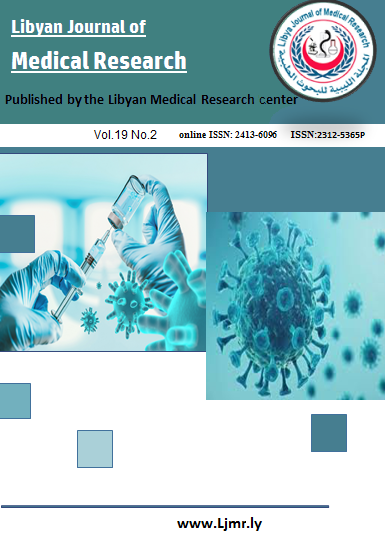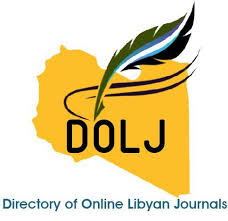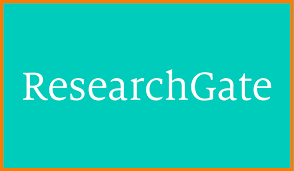Knowledge on Tracheostomy Among Nurses Working in Anaesthesia Departments and Intensive Care Units at Misurata in Medical Center and National Cancer Institute, Misurata, Libya (an important health education indicator for healthcare management, public heal
DOI:
https://doi.org/10.54361/LJMR.19.2.20Keywords:
Nurses, Knowledge, tracheostomy, Misurata Medical Center, National Cancer InstituteAbstract
Background:Airway obstruction is a medical emergency that requires artificial support for the airway, such as using endotracheal tubes or creating a tracheostomy. To maintain airway patency, a specialized nurse is required to provide care for this type of patient. The aim of this study was to assess the nurses’ level of knowledge of tracheostomy among nurses working at Misurata Medical Center and the National Cancer Institute, Misurata, Libya. Materials and Methods: An observational quantitative hospital-based survey using self-administered structured questionnaire was conducted among convenience sample of 75 nurses working in the medicine, surgical, and pediatric intensive care units at Misurata Medical Center and National Cancer Institute in Misurata, Libya. Results: Majority of nurses (93.3%) had a good level of knowledge, and 6.7%) nurses had a low level of knowledge. There was no significant association, there were no significant association between nurses’ knowledge and age, gender, education level, as well as work experience (P-value >0.05). Conclusion: The level of knowledge was high. Therefore, we hope and strongly support the continuing professional development during service for registered nurses working in the medicine, surgical, and pediatric intensive care units by conducting more courses and workshops to raise the knowledge and practice level.
Downloads
References
1. Natarajan H, Davis N, Holman BF. 1Royal Free London NHS Foundation Trust, London, United Kingdom. 2King’s College London, London, United Kingdom Background: This study aims to characterise noise across. Nuclear Medicine Communications. 2025;46(5).
2. of China CIRG. Recommendations for the management and rehabilitation of patients with a tracheostomy. Zhonghua jie he he hu xi za zhi= Zhonghua jiehe he huxi zazhi= Chinese journal of tuberculosis and respiratory diseases. 2023;46(10):965-76.
3. Organization WH. Health education: theoretical concepts, effective strategies and core competencies: a foundation document to guide capacity development of health educators. Health education: theoretical concepts, effective strategies and core competencies: a foundation document to guide capacity development of health educators2012.
4. Nazir S, Riaz S, Abbas Z, Akhtar S, Latif W. Nurses knowledge and practices regarding tracheostomy care in ICU patients. Pakistan Journal of Medical & Health Sciences. 2022;16(07):79-.
5. Gaterega T, Mwiseneza M-J, Chironda G. Nurses knowledge and practices regarding tracheostomy care at a selected referral hospital in Rwanda–A descriptive cross-sectional study. International Journal of Africa Nursing Sciences. 2021;15:100350.
6. Tamin S, Shabrina F, Hutauruk SM, Rachmawati EZK, Fardizza F, Koento T, et al. Tracheostomy decannulation readiness: A cross sectional study comparing standardised evaluation for tacheostomy decannulation to flexible endoscopic evaluation of swallowing examination. Med J Malaysia. 2024;79(2):119.
7. Mungan İ, Kazancı D, Bektaş Ş, Sarı S, Çavuş M, Turan S. The evaluation of nurses’ knowledge related to tracheostomy care in tertiary intensive care units. Int Med. 2019;1(6):313-8.
8. Pinto HJ, D'silva F, Sanil TS. Knowledge and practices of endotracheal suctioning amongst nursing professionals: a systematic review. Indian Journal of Critical Care Medicine: Peer-reviewed, Official Publication of Indian Society of Critical Care Medicine. 2020;24(1):23.
9. Ibraheem MH, Salah MA, Ali Hassan AM. Nurses’ Knowledge and Practice Regarding Caring of Patients with Tracheostomy in Suez Canal University Hospital. Trends in Nursing and Health Care Journal. 2024;8(1):105-27.
10. Padma K, Arundathi S, Latha A, Indira S, Sreelakshmi T. A study to assess the knowledge regarding tracheostomy care among staff nurses and nursing students in Narayana Medical College and Hospital, Nellore. Int J Adv Sci Res. 2016;1(3):5-8.
11. Khanum T, Zia S, Khan T, Kamal S, Khoso MN, Alvi J, et al. Assessment of knowledge regarding tracheostomy care and management of early complications among healthcare professionals. Brazilian Journal of Otorhinolaryngology. 2022;88(02):251-6.
12. Taha A, Akangire G, Noel-Macdonnell J, Gladdis T, Manimtim W. The impact of early tracheostomy on neurodevelopmental outcomes of infants with severe bronchopulmonary dysplasia exposed to postnatal corticosteroids. Journal of Perinatology. 2024;44(7):979-87.
13. Abu-Sahyoun R, ALBashtawy M, Mohammad K, Baker NA, Al-Sheyab N, Alyahya M, et al. Critical care nurses’ knowledge of tracheostomy care. Iranian Journal of Nursing and Midwifery Research. 2023;28(5):504-8.
14. Zeb A, Ul Haq S, Ali F, Hussain N, Haidar Ali Shah S, Faisal S. Knowledge and practice of ICU nurses regarding endotracheal suctioning in tertiary care hospitals, Peshawar. JOJ Nurse Health Care. 2017;2(4):555-95.
15. Sykes IV JJ, Edwards K, Danan D. Increasing health care providers' knowledge of tracheostomy and laryngectomy. Head & Neck. 2024;46(3):609-14.
16. Kolethekkat AA, Al Salmi HZ, Al Abri HK, Al Abri R. Insights on competency and knowledge related to the tracheostomy care of nurses at a Tertiary Referral Hospital in Oman. Indian Journal of Otolaryngology and Head & Neck Surgery. 2023;75(2):737-43.
Downloads
Published
Issue
Section
License
Copyright (c) 2025 Mohamed Ibrahim Jahan, Muftah Elbahloul, Khadija Ali Amer, Sana Alghennai, Osama H. Almajdoub, Abdul Rahman Amer Ashhoub, Othman Mohammed Elsadeg, Mohamed Ibrahim Embais, Abdalmalik MiladAlzaboub, Abduallah Ahmad Fadil (Author)

This work is licensed under a Creative Commons Attribution-NonCommercial-NoDerivatives 4.0 International License.
Open Access Policy
Libyan journal of medical Research (LJMR).is an open journal, therefore there are no fees required for downloading any publication from the journal website by authors, readers, and institution.
The journal applies the license of CC BY (a Creative Commons Attribution 4.0 International license). This license allows authors to keep ownership f the copyright of their papers. But this license permits any user to download , print out, extract, reuse, archive, and distribute the article, so long as appropriate credit is given to the authors and the source of the work.
The license ensures that the article will be available as widely as possible and that the article can be included in any scientific archive.
Editorial Policy
The publication of an article in a peer reviewed journal is an essential model for Libyan journal of medical Research (LJMR). It is necessary to agree upon standards of expected ethical behavior for all parties involved in the act of publishing: the author, the journal editorial, the peer reviewer and the publisher.
Any manuscript or substantial parts of it, submitted to the journal must not be under consideration by any other journal. In general, the manuscript should not have already been published in any journal or other citable form, although it may have been deposited on a preprint server. Authors are required to ensure that no material submitted as part of a manuscript infringes existing copyrights, or the rights of a third party.
Authorship Policy
The manuscript authorship should be limited to those who have made a significant contribution and intellectual input to the research submitted to the journal, including design, performance, interpretation of the reported study, and writing the manuscript. All those who have made significant contributions should be listed as co-authors.
Others who have participated in certain substantive aspects of the manuscript but without intellectual input should only be recognized in the acknowledgements section of the manuscript. Also, one of the authors should be selected as the corresponding author to communicate with the journal and approve the final version of the manuscript for publication in the LJMR.
Peer-review Policy
- All the manuscripts submitted to LJMR will be subjected to the double-blinded peer-review process;
- The manuscript will be reviewed by two suitable experts in the respective subject area.
- Reports of all the reviewers will be considered while deciding on acceptance/revision or rejection of a manuscript.
- Editor-In-Chief will make the final decision, based on the reviewer’s comments.
- Editor-In-Chief can ask one or more advisory board members for their suggestions upon a manuscript, before making the final decision.
- Associate editor and review editors provide administrative support to maintain the integrity of the peer-review process.
- In case, authors challenge the editor’s negative decision with suitable arguments, the manuscript can be sent to one more reviewer and the final decision will be made based upon his recommendations.















